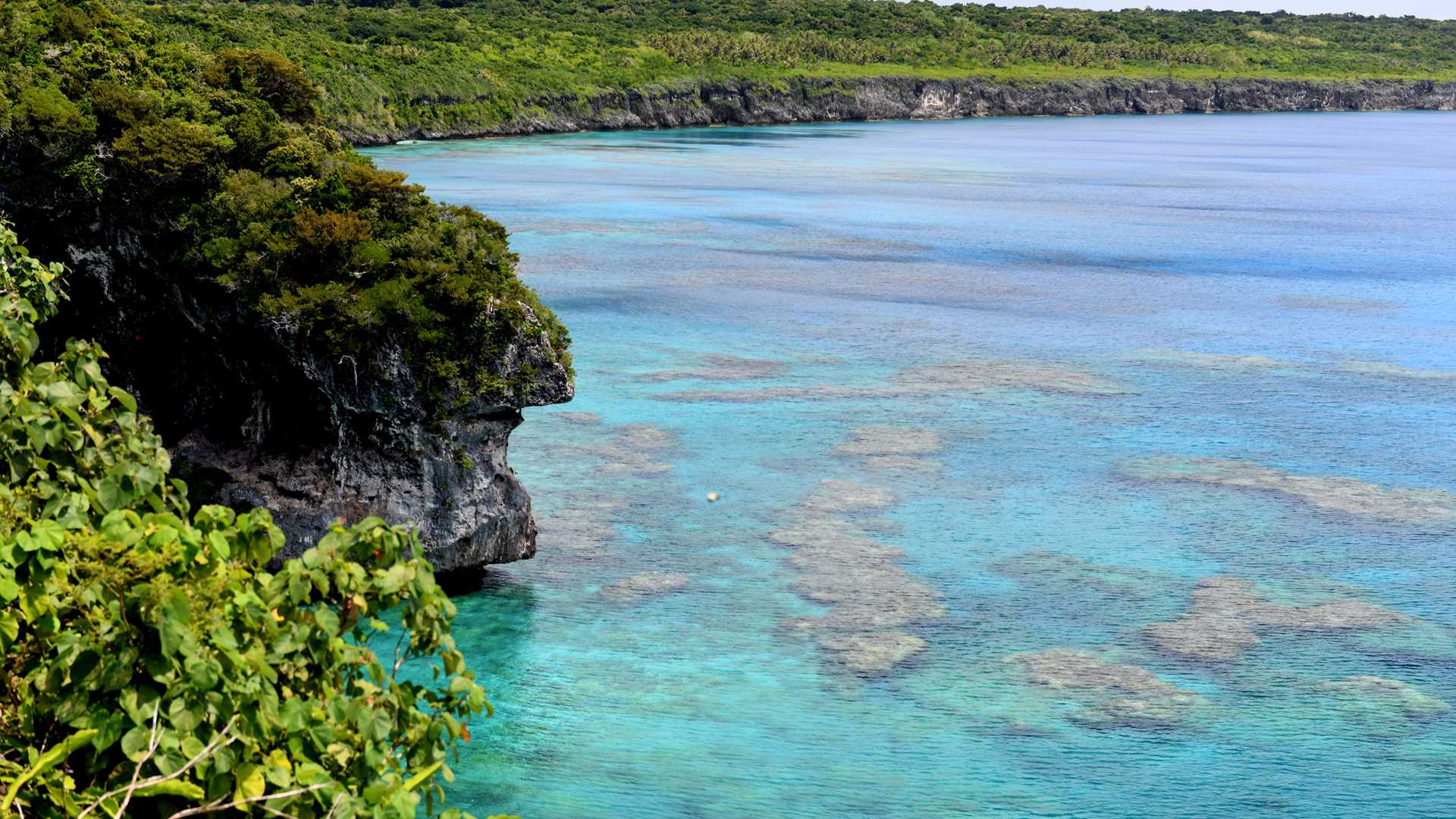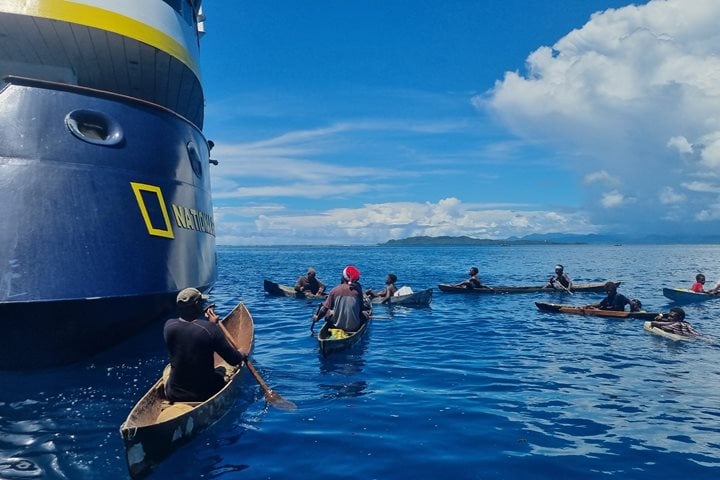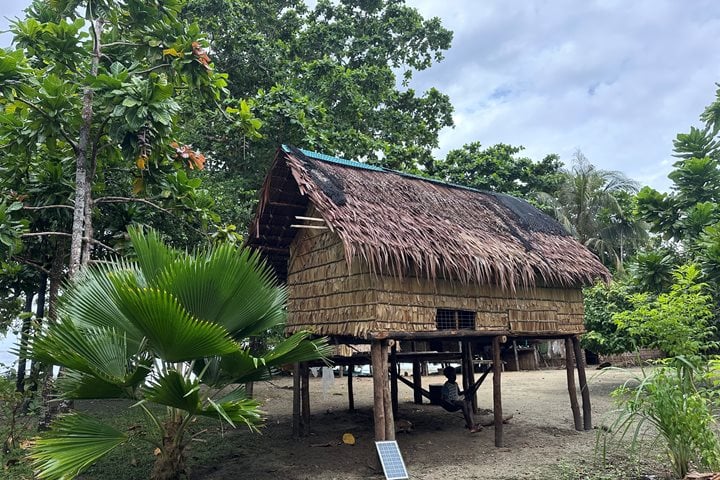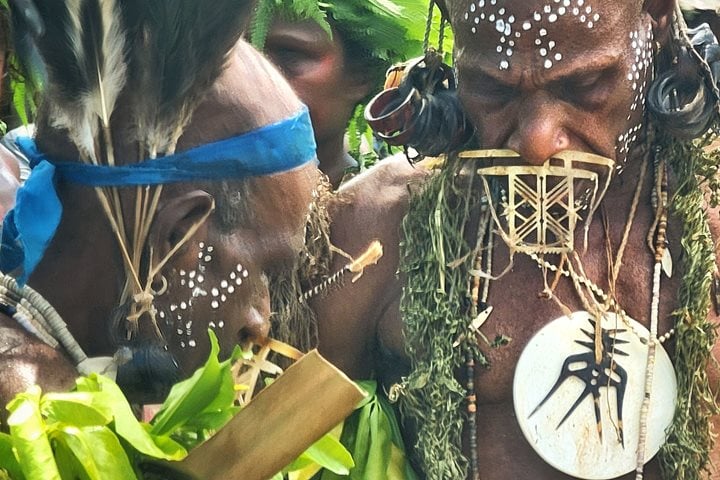We began the morning by traveling southward towards Lifou, New Caledonia at a whopping 13.2 knots or 15.26 miles per hour. The air temperature had cooled to 23.5° C (74° F), and the water temperature was a bit warmer at 24.8° C (77° F).
Light stretching with Lani began at 7:00 am. A delicious breakfast was served at 7:30 am followed by an incredible talk by National Geographic guest speaker Wade Davis on the global sweep of culture entitled, “The Light at the Edge of the World.” One of many things he discussed was the pleasure of living amongst those who have not forgotten the old ways. While our cultural visits on this voyage are brief, this enjoyment has been shared by all of us. The idea that all people teach us about other ways of being resonated with the group. Wade shared that, “of the seven thousand languages spoken on Earth, over half of those are not being whispered in the ears of infants now,” and that, “on average every two weeks an elder passes away and carries with them the last syllables of an ancient tongue.” He shared a quote from his good friend, Mamo Camilo: “Peace means nothing if it’s just an excuse for the three sides to come together to maintain a war against the natural world. It’s time for us to make peace with the natural world.”
After a portable and scrumptious brunch of sandwiches and cereal bars, passengers boarded Zodiacs and were dropped off on Lifou, a seahorse-shaped, raised coral atoll with the tall Araucaria columnaris conifers that are endemic to New Caledonia. Lifou, known as Drehu in the local Kanak language, has a large freshwater reservoir that can be accessed through caves, a school, little markets, a post office, a gendarmerie, and many churches from an earlier missionary presence that removed clans from the bush and grouped them into larger tribes. New Caledonia has 28 languages, and Kumo tribe dancers greeted us in their common language of French before a lovely presentation that included traditional drumming, basketweaving, flute playing, and singing.
On Lifou, we enjoyed bus tours, a tour of the Navarro tribe’s vanilla plantation, a tour of the cool tropical forest that is the heart of the Mucaweng tribe, and a visit to the Cliffs of Jokin. Intrepid travelers braved the 200 steps down the cliff to the ocean. They remarked on the beauty of the water and enjoyed tasting vanilla tea and coffee and a traditional Bougna meal. Snorkelers observed a white and black-banded sea snake (sea krate) and green sea turtles. Most of the dwellings on Lifou include a modern house along with a traditional sleeping hut, one of which we were able to tour. The huts use fire for heat as well as to keep away insects, and volcanic rock maintains the heat of the fire once it goes out. Traditional marriage involves a wedding that last two weeks. The bride joins her husband’s clan, and families gift sons to each other to keep houses alive. We learned that vanilla is one type of orchid out of 20,000 species. The process of preserving the pods for export takes at least ten months, and families with their own vanilla vines can bring in their pods for processing. Coffee is also grown and exported outside of the country.
Back on National Geographic Orion, we were treated to a delightful afternoon tea resplendent with fruits, sandwiches, and refreshing coconut beverages. National Geographic photographer Krista Rossow showed us her remarkable photos in a lesson on working the light with photography. David Cothran, our ship’s General Specialist, enlightened us about the continent of Te Riu-a-Maui, recently named by the Maori people and otherwise known as Zealandia. Kelly Coursey Gray, one of our naturalists, taught us about the finials on top of the traditional houses of the chiefs in the Kanak culture of New Caledonia.
We ended the day with a delectable dinner and a showing of Moana, which does an excellent job of showcasing Polynesian Culture and wayfinding, thanks to the involvement of cultural experts, including Wade Davis. After our group was able to briefly experience life on Lifou, we found it to be a good example of what Wade’s morning talk focused on: the importance of finding ways that everyone can benefit from modern society without demanding the death of who they are as a people.







